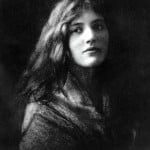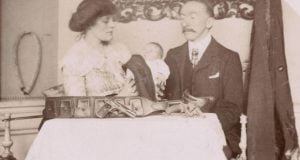The story has shifted to 1916. Maud and Iseult are living in Normandy, as the first world war wages and in Dublin, Irish freedom fighters have organized a botched insurrection. Many of their Irish friends and acquaintances were involved. This extract describes what happens when Maud Gonne hears of John MacBride's Execution for his part.
Now Read on:
***

Iseult Gonne
… They were in the drawing-room, with Maud about to open a newspaper from Ireland. Since the rebel rising, she'd been beseeching all and sundry in Dublin and London for newspapers. At the end of April, the Irish had surrendered to the English army and the English government responded, as they always do. Swift and ruthless. Execution.
Executions by firing squad for the ringleaders and signatories to the Irish Proclamation. All of them. One a day for days. Must be made an example, old chap. The country was at war, and that's all there was to it.
Most of those ringleaders and signatories were friends of Maud, some sources of vexation in her past, but now “her best and most noble friends”. She was overwhelmed by what she called their sacrifice and could speak and think of nothing else.
Each paper that arrived in the mail cart bore news that the government has taken out another.
And so they sat in front of the brown-wrapped newspaper, waiting for Maud to unrap it, the event treated each time like a sacrament. Who was it to be this time?Twelve-year-old Seán was sitting on one side of his mother, arms around her neck, ready to read what she read, feel what she felt. Delaney was on the other side, also vibrating with the same intensity, wanting to wrap her arms around Moura too, caught in her futile passion.
Iseult conveyed her opinion by sitting over at the window with her back to them, alone. Or rather with Marcus Aurelius, reading his sublime Meditations, boots up on the window-sill, eating an apple.
Then Moura said, almost wistfully, as if telling one of her dreams: “MacBride has been shot.”
Iseult turned to see her ostentatiously blessing herself and Bichon, wide-eyed, copying her, a second or two behind, waiting to be told what to think about what that meant.
“But he was not a ringleader.”
“No. This is revenge for fighting against them nearly twenty years ago in Africa.” Her hand was on her heart, her bosom under its white blouse was heaving. She had feelings for him yet, Iseult thought. As for Iseult…
She turned back to her book and her apple and tried not to hear the lines Maud was reading from his trial statement.
“On the morning of Easter Monday I left my home at Glengeary with the intention of going to meet my brother who was coming to Dublin to get married. In waiting around town I went up as far as Stephen’s Green and there I saw a band of Irish Volunteers.
I knew some of the members personally and the commander... that was MacDonagh, Iseult, Willie's great friend… the commander told me that an Irish Republic was virtually proclaimed.
He knew my rather advanced opinions and although I had no previous connection with the Irish Volunteers I considered it my duty to join them.”
“Oh, that nobel, man,” exclaimed Delaney. “Oh, the greatness of these men among us. Oh, Madame read on.”
Maud continued: “I knew there was no chance of success, and I never advised nor influenced any other person to join. I did not even know the positions they were about to take up. I marched with them to Jacob’s Factory.
After being a few hours there I was appointed second in command and I felt it my duty to occupy that position. I could have escaped from Jacob’s Factory before the surrender had I so desired but I considered it a dishonorable thing to do. I do not say this with the idea of mitigating any penalty you may impose but in order to make clear my position in the matter.”
So it was true. He was dead. More than dead, executed. A martyr. Somehow, Iseult had known that he would be. She had already imagined the scene and would always be imagining it in the future. The firing squad. The assassin, assassinated.
She hardly knew what to think.
Moura, of course, had no such trouble.
Having sat for a moment with her hand on her heart, she rose and took Bichon by his shoulders. “Listen to me. Your father died for his country, Seán. He did not behave well to us, that is true, but now we can remember him, think of him with honor.”
Bichon was understandably puzzled. Until that moment, his father was the bogeyman who might come in the night to steal him away.
Moura straightened and looked round at the adults. “MacBride has died for Ireland and his son will bear an honored name. I remember nothing else.”
She calls over. “Oh Iseult, ma belle. You know what this means? This means we can return to Ireland.”
Nothing else.
Delaney got going then, Iseult was surprised it had taken her so long, and began to howl. “They’ve never kilt him, no, oh no. Oh no, it is a tragedy.”
“Oh Delaney, stop your nonsense,” Iseult said.
“A terrible tragedy. Oh, the English scoundrels to do such a thing. May the soul of an Englishman be lost for every hair on his noble Irish head.”
Iseult takes her by the shoulders and shakes her, with quiet fury. “Nonsense, I say.”
Delaney stops shrieking and starts to sob. “You have no heart.”
Iseult has to walk away before she shakes her too hard for, of course, it is really Moura she would like to shake.
Nothing else.
The first book in the Yeats-Gonne Trilogy, Her Secret Rose is available here.


